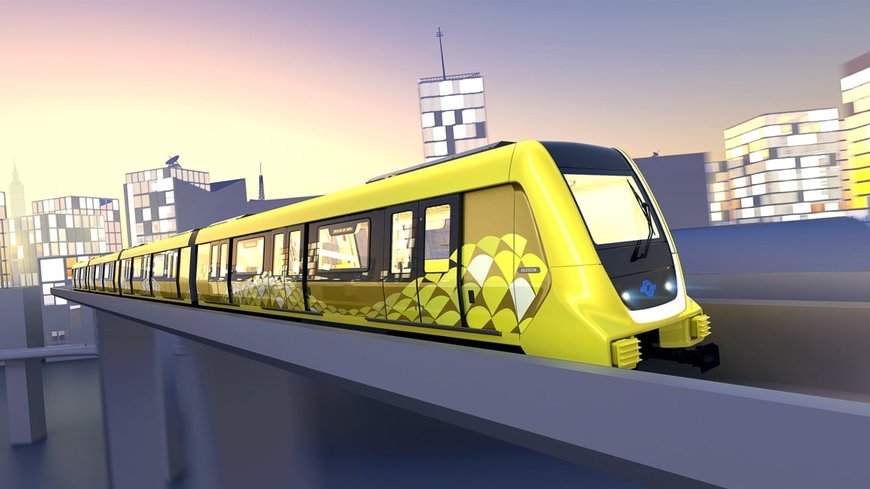railway-international.com
01
'21
Written on Modified on
Alstom-led consortium to deliver innovative integrated system for Taipei’s fully automated metro line
The Alstom-led consortium with Taiwanese engineering and contracting services company CTCI has been awarded a contract by the Systemwide E&M Project Office Department of Rapid Transit Systems of Taipei City Government (SEMPO) to provide its state-of-the-art integrated metro system for Taipei Circular Line Phase Two. Valued close to €720 million, this order for the city’s fully automated (Grade of Automation 4) metro line marks the recent consortium’s second turnkey metro project in Taiwan after the Wanda-Zhonghe-Shulin Line

Under the contract with its share at over €430 million[1], Alstom will also renew the signalling system for Phase One of the Circular Line[2]. The framework contract includes an order option to supply the line’s Phase Three system.
Phase Two of the Circular Line comprises a north and a south section, which spans 14.93 km with 12 underground stations and one depot, and 5.73 km with six underground stations, respectively.
Alstom will be responsible for 29 fully-automated four-car Metropolis trains, Urbalis 400 Communications-Based Train Control (CBTC) signalling system, Supervisory Control and Data Acquisition (SCADA) system, and Platform Screen Doors (PSD). CTCI will lead for the track work, power supply, depot equipment, telecommunication and ticketing systems. The project involves overhauling the existing CBTC signalling system during the limited engineering hours, to minimise the impact on passenger service.
"This contract with SEMPO is a vote of confidence in our internationally proven and quality mobility offering, and a testament to our team’s hard work over the last four decades towards making rail transport even more sustainable for the capital city of Taiwan."
Ling Fang
President of Alstom in Asia Pacific
“This contract with SEMPO is a vote of confidence in our internationally proven and quality mobility offering, and a testament to our team’s hard work over the last four decades towards making rail transport even more sustainable for the capital city of Taiwan. It also cements our position as the sole signalling supplier for the entire Metro Taipei network. Overall, this is an example of how the Asia-Pacific market remains dynamic and we aim to maintain our market leadership across most segments,” said Ling Fang, President of Alstom in Asia Pacific.
Alstom’s industrial units in Taubaté, Brazil (rolling stock), Le Creusot, France (bogies) and Bologna, Italy (signalling) will participate in the Circular Line project, supported by sites in Bangalore, India, Saint-Ouen (design), France and Taipei, Taiwan. The project management and system integration will be managed locally with the support of Alstom’s Turnkey engineering centre.
€720 M approximate contract value
29 fully-automated four-car Metropolis trains
14.93 km line with 12 underground stations and one depot
Alstom is a trusted partner to deliver integrated Turnkey rail systems for every mobility need. Alstom has earned a global leadership position, amassing extensive experience in the successful design, construction, commissioning and delivery of over 80 turnkey systems in commercial service worldwide. Singapore’s Circle Line and Panama Line 1 and 2 count among Alstom’s successes in integrated metro projects delivery, with the latest addition being the Dubai Metro Route 2020, inaugurated in July 2020.
Alstom also boasts at least 20 years of innovating driverless metros (GoA4) worldwide, with more than 600 such metros ordered. Its Asia Pacific region presently hosts 13 GoA4 metro systems in service, including, Delhi’s Grey Line, Hong Kong’s South Island Line (East), Kuala Lumpur’s Sungai Buloh-Kajang Line, Singapore’s Thomson-East Coast Line, Sydney’s North West Metro and Taichung’s Green Line.
Alstom™, Citadis™, Metropolis™ and Urbalis™ are protected trademarks of the Alstom Group
[1] This amount has been recorded in the second quarter of Alstom’s 2021/2022 financial year.
[2] Phase One or the central section of the line, covering 14 stations and one depot over 15.4 km, has been in operation since January 2020.
www.alstom.com

